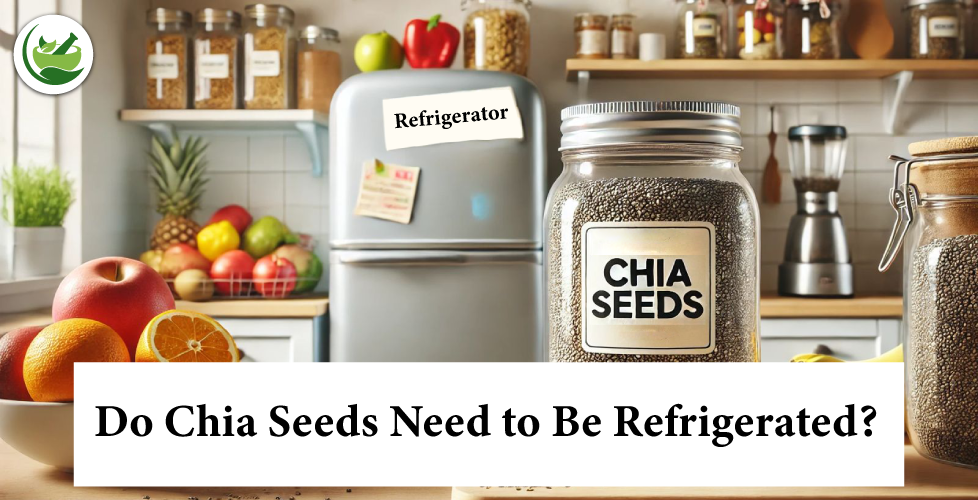Chia seeds have become a popular superfood, known for their numerous health benefits and versatility in recipes. However, a common question that arises is whether chia seeds need to be refrigerated. In this blog, we will delve into expert insights and tips to answer this question comprehensively.
Related blog Do Chia Seeds Have Gluten? Benefits of a Gluten-Free Diet

Understanding Chia Seeds and Their Shelf Life
Chia seeds (Salvia hispanica) are incredibly durable and have a long shelf life due to their high antioxidant content, which helps to preserve their nutrients. Unopened packages of chia seeds can last for years if stored in a cool, dry place. However, once opened, their shelf life can be affected by exposure to air, light, and moisture.
The Role of Refrigeration
While refrigeration is not strictly necessary for chia seeds, it can be beneficial. Here are some key points to consider:
Prolonging Freshness: Refrigeration can help extend the freshness of chia seeds by slowing down the oxidation process. This is particularly important if you live in a hot and humid climate where the seeds might be more prone to spoilage.
Preventing Rancidity: Chia seeds contain healthy fats that can go rancid if exposed to heat and light for prolonged periods. Storing them in the refrigerator can help maintain their quality and prevent them from developing an off taste or smell.
Avoiding Pests: Refrigerating chia seeds can also protect them from pantry pests, such as moths and weevils, which are more common in warm environments.
Related blog How to Make the Perfect Oatmeal with Chia Seeds
Expert Storage Tips for Chia Seeds
To keep your chia seeds in optimal condition, follow these expert storage tips:
Airtight Containers: Whether you choose to refrigerate your chia seeds or not, always store them in an airtight container. This prevents exposure to air and moisture, which can degrade the seeds.
Cool, Dark Place: If you prefer not to refrigerate your chia seeds, store them in a cool, dark place, such as a pantry or cupboard. Ensure they are away from direct sunlight and heat sources.
Refrigerate for Longer Shelf Life: For extended freshness, especially if you buy chia seeds in bulk, consider refrigerating them. This is particularly useful if you don’t plan to use them quickly.
Freezing Chia Seeds: If you have a large quantity of chia seeds and want to ensure they remain fresh for an extended period, you can also freeze them. Use a freezer-safe, airtight container or resealable bag, and make sure to label it with the date.
Check for Freshness: Before using chia seeds, always check for any signs of spoilage, such as an off smell, taste, or discoloration. If you notice any of these signs, it’s best to discard the seeds.
Related blog How Much Health Benefits of Protein in Chia Seeds 1 Tbsp
Practical Uses of Chia Seeds
Chia seeds are versatile and can be used in various recipes, adding a nutritional boost to your meals. Here are some popular ways to incorporate them into your diet:
Smoothies: Add a tablespoon of chia seeds to your favorite smoothie for added fiber and omega-3s.
Chia Pudding: Mix chia seeds with your choice of milk and sweetener, then let it sit in the refrigerator overnight to create a delicious and healthy pudding.
Baking: Use chia seeds in baking recipes, such as muffins, bread, and cookies, for added texture and nutrition.
Salads and Yogurt: Sprinkle chia seeds over salads or mix them into yogurt for a crunchy, nutritious topping.
Related blog Why and How Can You Blend Chia Seeds for Better Nutrition?
Conclusion
So, do chia seeds need to be refrigerated? While it’s not a strict requirement, refrigeration can help prolong their freshness and prevent rancidity, especially in warm and humid environments. By following the expert storage tips provided, you can ensure your chia seeds remain fresh and ready to enhance your meals with their numerous health benefits. Whether you choose to refrigerate them or not, proper storage is key to enjoying the full nutritional value of chia seeds.






